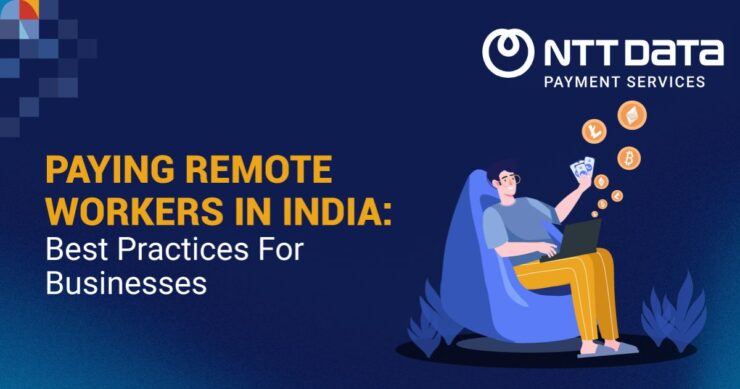
Table of Contents
As remote work becomes increasingly popular, India has become a prime destination for businesses seeking talented remote workers. However, paying remote workers in India requires businesses to adopt best practices to ensure fair and efficient payment processes.
Let’s explore key considerations for businesses when paying remote workers in India.
Understanding Paying Remote Workers in India
Today, businesses are looking to leverage the skills and expertise of remote Indian workers. This makes it crucial to establish effective payment practices. By adhering to best practices, businesses can ensure a smooth and mutually beneficial relationship with their remote workforce.
Recent Web Stories
6 Best Practices For Businesses To Pay Remote Workers
In recent years, remote work has become a prevailing trend in the global workforce, and India has emerged as a key destination for remote workers due to its vast talent pool and cost-effective labour. For businesses looking to leverage the skills and expertise of Indian remote workers, it is crucial to establish effective payment practices.
Here are the following standard payment practices for remote workers:
1. Understand Local Labour Laws:
You must familiarise yourself with the country’s labour laws and regulations. India has specific employment laws that govern working hours, minimum wages, leaves, and more. Understanding these laws ensures businesses remain compliant and avoid potential legal issues. Engaging local legal counsel or consulting with HR experts well-versed in Indian labour laws can be immensely helpful in this regard.
2. Establish Clear Payment Terms:
Clarity in payment terms is fundamental to the employer-employee relationship. When hiring remote workers in India, you should define the payment frequency, preferred payment method, and currency in which the employees will be paid. Providing a comprehensive breakdown of these terms in the employment contract or agreement ensures both parties are on the same page from the outset, reducing the likelihood of misunderstandings or disputes later.
3. Consider Currency Exchange Rates and Fees:
When paying remote workers in India, currency exchange rates and associated fees can impact the actual amount received by the workers. Businesses should stay updated on exchange rates and choose cost-effective payment methods to minimise transaction fees. Collaborating with reputable banks or financial institutions can ensure smooth and economical cross-border payments. Additionally, discussing currency exchange practices with remote workers and finding mutually beneficial solutions can be beneficial.
Getting the best payment gateway support while making online transactions with your remote workers is also important.
4. Factors Affecting Local Cost of Living
One of the primary reasons businesses turn to remote Indian workers is the cost-effectiveness of hiring talent from this region. However, it is essential to recognize that the cost of living can vary significantly across different cities and regions in India. You should conduct thorough research to determine fair and competitive compensation that aligns with the local cost of living. Offering remuneration that reflects local standards enhances employee satisfaction and fosters long-term commitment.
5. Implement Performance-Based Compensation:
Performance-based compensation is an effective way to motivate and reward remote workers for their hard work and dedication. You can establish transparent performance evaluation criteria and metrics to gauge the productivity and quality of work delivered by remote workers in India. Regular performance reviews help identify top performers and provide them with incentives, such as bonuses or salary hikes, fostering a culture of excellence and driving better results.
6. Ensure Timely and Consistent Payments:
Timely payment is crucial to build trust and maintain a healthy working relationship with remote workers. Adhering to the payment schedule and promptly processing payments demonstrates professionalism and reliability. Utilise technology-driven solutions like automated payroll systems to streamline the payment process, minimise delays, and ensure consistency in payment cycles. Regularly communicate any payment schedule changes to avoid misunderstandings or inconveniences.
It is really important that you have the best payment gateway to make all your transactions fast and secure.
| Fun Fact: India is home to one of the world’s largest populations of English-speaking professionals, making it an ideal destination for businesses seeking remote workers proficient in the English language. |
Embrace Security And Speed On Your Online Payments With NTT DATA Payment Services
As a company, you can secure all your online payments and make them seamless with NTT DATA Payment Services. You can access PCI DSS 3.2.1V, a 256-bit encrypted payment gateway. This keeps your information security bulletproof and makes your transactions limitless and quicker.
NTT DATA Payment Services offers a complete payment solution to advance your offline and online businesses from,
- Online Payment Gateway in India
- POS machines
- IVR payments
- Mobile applications, and
- Bharat QR Scan and Pay
We ensure maximum comfort, convenience, and safety for all your payments.
Best Practices For Effective And Fair Payment To Remote Workers in India
As remote work continues to thrive, paying remote workers in India requires businesses to adopt best practices to ensure fair and efficient payment processes. Embracing these best practices fosters trust and motivation among remote workers and contributes to the overall success of businesses in a global, remote work landscape.
| Also, you can get frequent updates on nttdatapayments Instagram page. |
FAQs
- How do remote workers get paid?
Remote workers get paid through online modes; If you are a remote worker, you can receive your payments via UPI, NEFT, and online banking.
- How can I hire remote employees in India?
You can hire employees in India using any of the following three methods:
- Contact a Local PEO
- Establish a legal entity in the country
- Contact contractual employees
- How do remote companies pay their employees?
Remote companies pay their remote workers in their country’s currency unless the freelancer opens a foreign currency account.
- How to incentivise remote employees without money?
These are a few ways you can incentivise your remote employees:
- Communication is the key; always stay in touch
- Offer health benefits
- Be attentive towards employee feedback
- Provide the best tools for remote workers to work with
- How do you make remote employees feel valued?
Here are some ways you can use to make your remote employees feel valued:
- Have flexible working hours
- Make your appreciation constructive
- Host virtual team-building events
- Communicate frequently
- Recognise birthdays and work anniversaries





